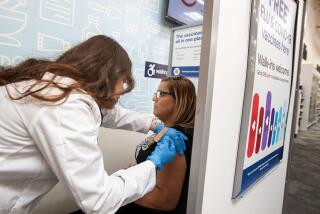Vaccines Can Make Journeys Safer
Getting an update on childhood immunizations is a good idea when venturing out of the country. As a bonus, the traveler may learn which are not up to date.
“We have been repeatedly struck by the number of otherwise sophisticated adults who come in for exotic vaccines (such as yellow fever or cholera) and are found to be unprotected by basic immunizations,” says Dr. Elaine C. Jong, director of the travel medical service at the University of Washington School of Medicine in Seattle. Some 40% of the adults who visit her clinic require a polio booster, and one-third need a tetanus-diphtheria shot.
The need for immunization is perhaps more important than it sounds. Although polio, for example, is no longer a significant risk in the United States, it is still an enormous problem in Africa and some other developing countries. Tetanus, diphtheria, measles, mumps and rubella are also widespread in just about all developing countries.
People traveling with children, who may be especially susceptible, should make note of the fact that 300 cases of diphtheria with 18 deaths were reported in Moscow in 1990. And outbreaks occur in other parts of the Soviet Union.
Whether more exotic vaccines are necessary depends on the area of the world to be visited. Most developed countries, such as Canada, Australia, New Zealand, Japan and Europe, pose no greater health risk than those we face at home, according to the U.S. Public Health Service. So no unusual vaccines are required for travel there. But the risk of acquiring vaccine-preventable disease rises when the traveler journeys to Asia, Africa, South America, Central America, Mexico, the South Pacific and Middle East, particularly if he stays in places other than posh hotels.
Spending more than a day or two in small villages or rural areas ups the risks since the traveler is more apt to come in contact with local children, water and food. The safest approach, then, regardless of the destination, is to keep childhood disease immunizations updated and consume only cooked food and boiled or bottled water.
Among the more common immunizations, typhoid is still recommended for travelers who will have prolonged exposure to potentially contaminated water or food, usually through visits to places off the typical tourist path in Africa, Asia, Central and South America. A newly licensed oral typhoid vaccine is reported to produce fewer side effects. The greatest risk is in Peru, India, Pakistan and China, according to the Centers for Disease Control in Atlanta.
Some doctors who specialize in travel health recommend a flu shot, particularly for people going to Asia. This is because of the high density population in much of Asia, which increases the chances for picking up the flu virus.
Ordinarily, the U.S. Public Health Service recommends annual flu vaccines for everyone over 60, even if they’re staying at home, as well as for people of any age who have a serious chronic diseases such as emphysema, diabetes or heart disease.
Provided routine immunizations are complete, most U.S. citizens traveling internationally will not need to take less commonly given shots.
Among the less common vaccinations are:
Smallpox. Vaccination against smallpox was deleted in 1982 from the World Health Organization’s list of immunizations actively required by any country following global eradication of the disease in 1980.
Yellow fever. At present, the yellow fever vaccine is the only immunization listed by the World Health Organization as being required for entry into some countries. (Yellow fever is a viral disease acquired by mosquito bite.) Those regions include large parts of equatorial Africa and South America. The immunization must be administered at a yellow fever vaccination center that has been approved by a state health department. Contact your local health department to find center locations. Although the U.S. Public Health Service recommends this vaccine not be taken by pregnant women, unpleasant reactions to the vaccine are said to be mild.
Determining which countries require yellow fever vaccines and under what circumstances can seem complicated. Parts of Peru, for example, are in the yellow fever zone while other parts are not. Travelers who will only visit Lima and vicinity, the coastal area south of Lima or the highland tourist areas of Cuzco, Machu Picchu and Lake Titicaca need no vaccine. But it is recommended in certain other rural areas where the risk is high.
Some African countries may waive the yellow fever vaccine requirements for travelers coming from noninfected areas and staying less than two weeks.
Some countries require that the traveler, even in transit, have a valid International Certificate of Vaccination if he or she has been in countries either known or thought to harbor the yellow fever virus. The center where the vaccination is obtained can provide up-to-date information on this.
Cholera. Even though cholera is present in Peru and Ecuador right now, the risk of cholera to U.S. travelers is so low that the U.S. Public Health Service is not recommending vaccinations. The health service also questions the effectiveness of the cholera vaccine, which is said to be only 50% protective. The World Health Organization eliminated cholera immunizations as an international travel requirement in 1973.
People who follow the usual tourist itinerary and stay in standard accommodations in countries reporting cholera are at virtually no risk of infection, according to the health service. Still, several dozen countries require proof of immunization at the port of entry, especially if the traveler has visited a cholera-infected area. For this reason, some physicians advise having the shot before leaving home in order to avoid having to receive an injection in a developing country.
Immune globulin. For adults, immune globulin is recommended as a preventive for hepatitis A in rural developing countries where there is poor sanitation.
Hepatitis B. It is recommended only for travelers who may receive a blood transfusion or be sexually active in countries where hepatitis B is common.
Meningococcal. Meningococcal disease occurs mostly in a belt of sub-Sahara African countries extending from the west coast to Ethiopia. Last year, following an uncommon epidemic in Kenya and northern Tanzania, the CDC recommended that all U.S. travelers to those countries be vaccinated. Check to see whether an advisory applies.
Others. Vaccines exist also for Japanese encephalitis, hemophilus influenza, plague, rabies and typhus but are not commonly ordered for ordinary travelers.
It is important to receive vaccinations well ahead of departure date--and not all of them at once. The more vaccines received at one time, the greater the chance of unpleasant side effects.
More detailed information about what immunizations are required in specific countries can be obtained through the U.S. Centers for Disease Control, (404) 332-4559, or from your local health department.
More to Read
Sign up for The Wild
We’ll help you find the best places to hike, bike and run, as well as the perfect silent spots for meditation and yoga.
You may occasionally receive promotional content from the Los Angeles Times.






